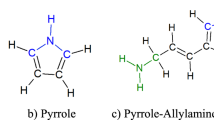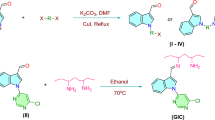Abstract
Herein, the oxidative polymerization of 4-methyl catechol using different oxidants including NaOCl, H2O2, and air were reported. Potassium hydroxide solution was used as the reaction solvent and polymerization studies were carried out between 323 and 363 K. Optimum reaction conditions of the polymerization were established and NaOCl was found as the most active oxidant. The structure and characterization of the polymer using FT-IR, ultraviolet–visible (UV–Vis), 1H-NMR, 13C-NMR, thermogravimetry and size exclusion chromatography were confirmed. In addition, the relationship between molar mass distribution of polymer and kinetics parameters such as activation energy, pre-exponential factor of decomposition process was investigated. For this purpose, methods based on multiple heating rates such as Flynn–Wall–Ozawa, Friedman, Tang, Kissinger–Akahira–Sunose, and Kissinger were used. The results obtained show that activation energy increased with an increase of molar mass.







Similar content being viewed by others
References
Doğan F, Kaya İ, Bilici A. Azomethine-based phenol polymer: synthesis, characterization and thermal study. Synth Met. 2011;161(1–2):79–86.
Kaya İ, Doğan F, Bilici A. Schiff base-substituted polyphenol: synthesis, characterisation and non-isothermal degradation kinetics. Polym Int. 2009;58(5):570–8.
Doğan F, Kaya İ, Bilici A. Non-isothermal degradation kinetics of poly (2,2′-dihydroxybiphenyl). Polym Bull. 2009;63(2):267–82.
Kaya İ, Aydın A, Yıldırım M. Syntheses and spectrophotometric P(H) sensing applications of poly-2-[4-(diethylaminophenyl)imino]-5-nitro-phenol and its Schiff base monomer for two different P(H) ranges. J Fluoresc. 2012;22(1):495–504.
Kaya İ. Synthesis, characterization, conductivity, band gap, and thermal analysis of poly-[(2-mercaptophenyl)iminomethyl]-2-naphthol and its polymer–metal complexes. J Inorg Organomet Polym. 2010;20(2):369–79.
Siimer K, Kaljuvee T, Christjanson P, Pehk T, Saks I. Effect of alkylresorcinols on curing behaviour of phenol–formaldehyde resol resin. J Therm Anal Calorim. 2008;91(2):365–73.
Worzakowska M. The influence of tertiary aromatic amines on the BPO initiated cure of unsaturated epoxy polyesters with styrene studied by non-isothermal DSC. J Therm Anal Calorim. 2011;105(3):987–94.
Alonso MV, Oliet M, Domínguez JC, Rojo E, Rodríguez F. Thermal degradation of lignin–phenol–formaldehyde and phenol–formaldehyde resol resins, structural changes, thermal stability, and kinetics. J Therm Anal Calorim. 2011;105(1):349–56.
Kobayashi S, Higashimura H. Oxidative polymerization of phenols revisited. Prog Polym Sci. 2003;28:1015–48.
Rotaru A, Goşa M. Computational thermal and kinetic analysis complete standard procedure to evaluate the kinetic triplet form non-isothermal data. J Therm Anal Calorim. 2009;97(2):421–6.
Doğan F, Kaya İ, Yürekli M. Kinetic of thermal degradation of poly(isobornyl methacrylate). Catal Lett. 2007;114(1–2):49–54.
Doğan F, Ulusoy M, Ozturk OF, Kaya İ, Salih B. Synthesis, characterization and thermal study of some tetradentate Schiff base transition metal complexes. J Therm Anal Calorim. 2009;98:785–92.
Doğan F. Development of a computer programme related to the methods of kinetic analysis of thermogravimetric data and its application to the kinetics of thermal decomposition and degradation of polymers, Ph.D. Thesis, Ege University, Izmir; 2006.
Aktaş N, Şahiner N, Kantoğlu Ö, Salih B, Tanyolaç A. Biosynthesis and characterization of laccase catalyzed poly(catechol). J Polym Environ. 2003;11:123–8.
Tang W, Liu Y, Yang X, Wang C. Kinetic studies of the calcination of ammonium metavanadate by thermal methods. Ind Eng Chem Res. 2004;43(9):2054–9.
Akahira T, Sunose T. Research report of Chiba Institute Technology. Sci Technol. 1971;16:22–31.
Kissinger HF. Reaction kinetics in different thermal analysis. Anal Chem. 1957;29:1702–6.
Flynn J, Wall L. A quick, direct method for the determination of activation energy from thermogravimetric data. J Polym Sci Part B Polym Lett. 1966;4:323–8.
Ozawa T. A new method of analysing thermogravimetric data. Bull Chem Soc Jpn. 1965;38:1881–6.
Friedman HL. Kinetics of thermal degradation of char-forming plastics from thermogravimetry. Application to a phenolic plastic. J Polym Sci. 1965;C6:183–95.
Author information
Authors and Affiliations
Corresponding author
Rights and permissions
About this article
Cite this article
Doğan, F., Topallar, H., Kaya, İ. et al. The effect of the oxidant used during polymerization on the solid-state decomposition kinetics of poly(4-methyl catechol). J Therm Anal Calorim 111, 1515–1522 (2013). https://doi.org/10.1007/s10973-012-2517-x
Received:
Accepted:
Published:
Issue Date:
DOI: https://doi.org/10.1007/s10973-012-2517-x




